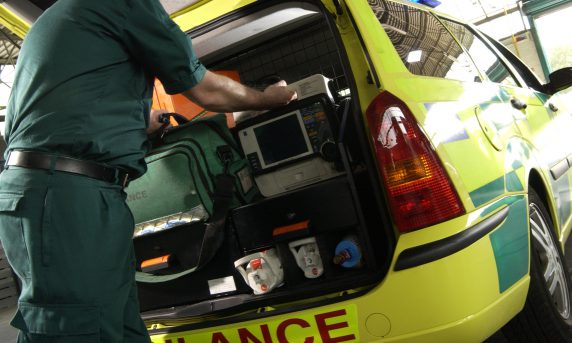GP waits two hours for ambulance after operator reveals backlog of 100 emergencies

GPs in Doncaster are facing lengthy delays when they call 999 for patients due to the local ambulance service experiencing backlogs of up to 100 emergencies at a time.
Dr Dean Eggitt, a partner at Oakwood Surgery, had to wait for two hours for an ambulance to arrive after calling for emergency assistance for a patient with suspected meningococcal septicaemia.
He went on to administer oxgyen and benzylpenicillin to the patient at his practice, having been informed by the dispatcher from Yorkshire Ambulance Service NHS Trust that 100 emergencies were also waiting.
Dr Eggitt said the incident showed how patients’ basic needs are failing to be met due to the ambulance service and wider NHS being ‘starved’ of investment.
It follows a Pulse investigation earlier this year that revealed GPs across the country are being left waiting hours for emergency help, with ambulance services being accused of downgrading GP calls because they believe patients are safe.
Dr Eggitt said: ‘Instead of equipping the emergency services with the resources they need, the NHS has been starved of investment.
‘So, decisions have been made for us all in the NHS to “make do” with what we have. This includes the absurd idea that patients are safe in a GP practice, when what they really need is emergency care.
‘This has allowed the emergency services flexibility in downgrading sick patients to less severe categories for the purpose of meeting targets. These policies aren’t about safe patient care. They’re about being seen to meet targets.’
He added: ‘If we really wanted safe care, we would agree sustained investment in the NHS to increase capacity to care for patients.’
Yorkshire Ambulance Service NHS Trust did not dispute that it has experienced backlogs of up to 100 emergencies at a time, and said it would be ‘happy to look into any specific issues which have been experienced in Doncaster’.
Dr Steven Dykes, the deputy medical director at the trust, said: ‘Like all other ambulance services across England, Yorkshire Ambulance Service has implemented the national framework for handling ambulance requests from healthcare professionals, which is focused on providing the right response to patients based on their clinical need and provides equity of access for all seriously ill and injured patients.’
NHS England brought in a new framework for handling emergency calls earlier this year, which included aligning the targets for response times to calls from healthcare professionals with calls from the public, for the most serious incidents.
It also introduced a new system requiring all GPs requesting emergency ambulances to have to provide a ‘score’ or clinical reason for calling – a move that has been criticised by the BMA for risking patient safety.
The NEWS2 system, the latest version of the National Early Warning Score, first used by the NHS in 2012, is calculated by the severity of symptoms, and assesses respiration rate, oxygen saturation, systolic blood pressure, pulse rate, level of consciousness or new confusion and temperature.
Pulse July survey
Take our July 2025 survey to potentially win £1.000 worth of tokens




 Oviva’s fully remote Tier 3 Weight Management programme
Oviva’s fully remote Tier 3 Weight Management programme







